Introduction to Entrepreneurship and Innovation Report
VerifiedAdded on 2023/01/04
|6
|1158
|94
Report
AI Summary
This report provides an introduction to entrepreneurship and innovation, delving into the crucial role of passion in achieving organizational success. It examines the importance of enthusiasm, customer and product focus, tenacity, and execution intelligence as key characteristics of successful entrepreneurs. The report emphasizes the significance of these traits in navigating the dynamic business environment and driving sustained improvement. It highlights the need for entrepreneurs to be enthusiastic, customer-centric, persistent, and capable of translating ideas into effective strategies. The report is a valuable resource for understanding the core principles of entrepreneurship and the qualities that contribute to business success.
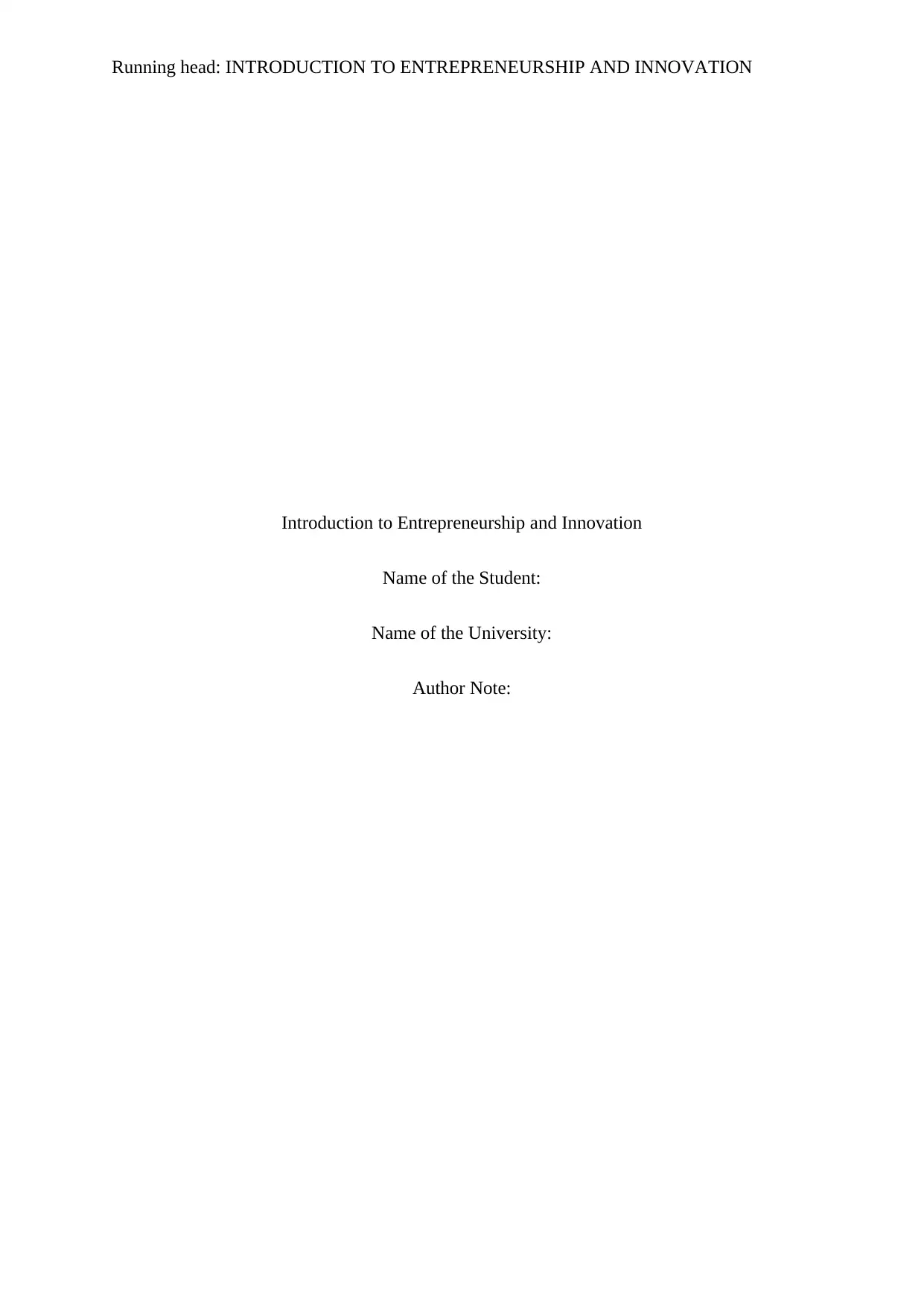
Running head: INTRODUCTION TO ENTREPRENEURSHIP AND INNOVATION
Introduction to Entrepreneurship and Innovation
Name of the Student:
Name of the University:
Author Note:
Introduction to Entrepreneurship and Innovation
Name of the Student:
Name of the University:
Author Note:
Paraphrase This Document
Need a fresh take? Get an instant paraphrase of this document with our AI Paraphraser

1INTRODUCTION TO ENTREPRENEURSHIP AND INNOVATION
Table of Contents
Introduction................................................................................................................................2
Passion- A critical part of Organisational Success....................................................................2
Four Essential Characteristics of Successful Entrepreneurs......................................................3
Conclusion..................................................................................................................................4
References..................................................................................................................................5
Table of Contents
Introduction................................................................................................................................2
Passion- A critical part of Organisational Success....................................................................2
Four Essential Characteristics of Successful Entrepreneurs......................................................3
Conclusion..................................................................................................................................4
References..................................................................................................................................5
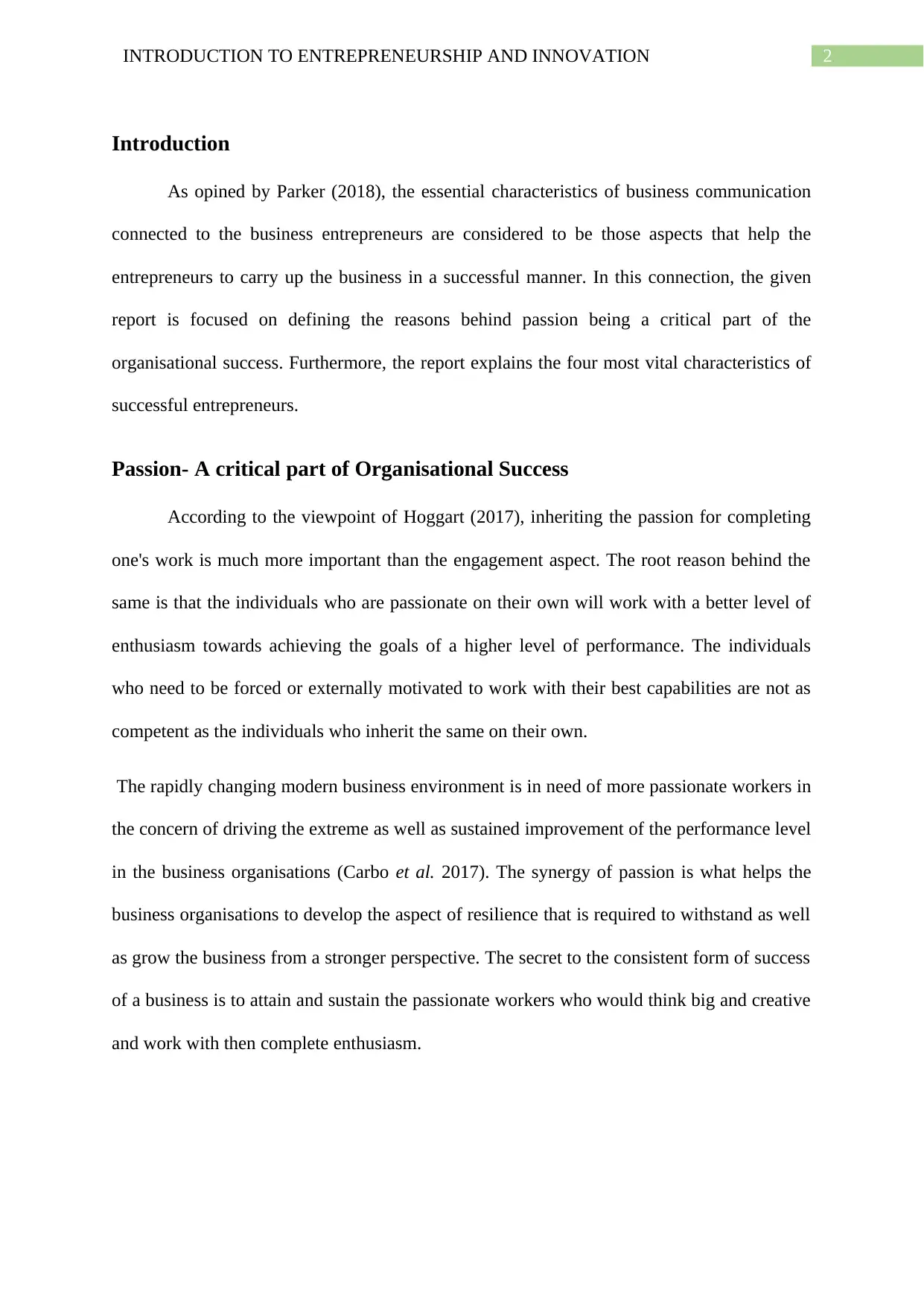
2INTRODUCTION TO ENTREPRENEURSHIP AND INNOVATION
Introduction
As opined by Parker (2018), the essential characteristics of business communication
connected to the business entrepreneurs are considered to be those aspects that help the
entrepreneurs to carry up the business in a successful manner. In this connection, the given
report is focused on defining the reasons behind passion being a critical part of the
organisational success. Furthermore, the report explains the four most vital characteristics of
successful entrepreneurs.
Passion- A critical part of Organisational Success
According to the viewpoint of Hoggart (2017), inheriting the passion for completing
one's work is much more important than the engagement aspect. The root reason behind the
same is that the individuals who are passionate on their own will work with a better level of
enthusiasm towards achieving the goals of a higher level of performance. The individuals
who need to be forced or externally motivated to work with their best capabilities are not as
competent as the individuals who inherit the same on their own.
The rapidly changing modern business environment is in need of more passionate workers in
the concern of driving the extreme as well as sustained improvement of the performance level
in the business organisations (Carbo et al. 2017). The synergy of passion is what helps the
business organisations to develop the aspect of resilience that is required to withstand as well
as grow the business from a stronger perspective. The secret to the consistent form of success
of a business is to attain and sustain the passionate workers who would think big and creative
and work with then complete enthusiasm.
Introduction
As opined by Parker (2018), the essential characteristics of business communication
connected to the business entrepreneurs are considered to be those aspects that help the
entrepreneurs to carry up the business in a successful manner. In this connection, the given
report is focused on defining the reasons behind passion being a critical part of the
organisational success. Furthermore, the report explains the four most vital characteristics of
successful entrepreneurs.
Passion- A critical part of Organisational Success
According to the viewpoint of Hoggart (2017), inheriting the passion for completing
one's work is much more important than the engagement aspect. The root reason behind the
same is that the individuals who are passionate on their own will work with a better level of
enthusiasm towards achieving the goals of a higher level of performance. The individuals
who need to be forced or externally motivated to work with their best capabilities are not as
competent as the individuals who inherit the same on their own.
The rapidly changing modern business environment is in need of more passionate workers in
the concern of driving the extreme as well as sustained improvement of the performance level
in the business organisations (Carbo et al. 2017). The synergy of passion is what helps the
business organisations to develop the aspect of resilience that is required to withstand as well
as grow the business from a stronger perspective. The secret to the consistent form of success
of a business is to attain and sustain the passionate workers who would think big and creative
and work with then complete enthusiasm.
⊘ This is a preview!⊘
Do you want full access?
Subscribe today to unlock all pages.

Trusted by 1+ million students worldwide
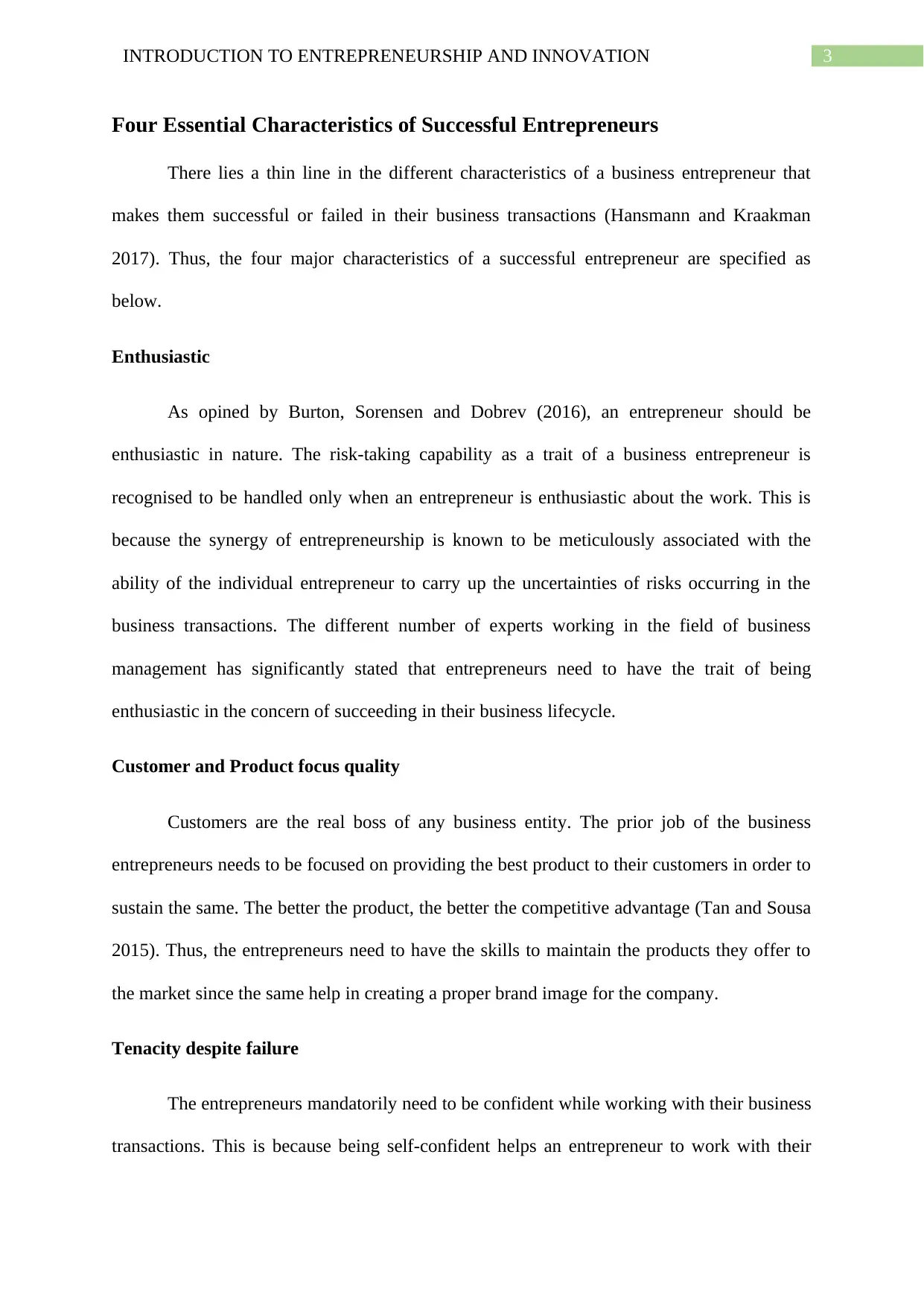
3INTRODUCTION TO ENTREPRENEURSHIP AND INNOVATION
Four Essential Characteristics of Successful Entrepreneurs
There lies a thin line in the different characteristics of a business entrepreneur that
makes them successful or failed in their business transactions (Hansmann and Kraakman
2017). Thus, the four major characteristics of a successful entrepreneur are specified as
below.
Enthusiastic
As opined by Burton, Sorensen and Dobrev (2016), an entrepreneur should be
enthusiastic in nature. The risk-taking capability as a trait of a business entrepreneur is
recognised to be handled only when an entrepreneur is enthusiastic about the work. This is
because the synergy of entrepreneurship is known to be meticulously associated with the
ability of the individual entrepreneur to carry up the uncertainties of risks occurring in the
business transactions. The different number of experts working in the field of business
management has significantly stated that entrepreneurs need to have the trait of being
enthusiastic in the concern of succeeding in their business lifecycle.
Customer and Product focus quality
Customers are the real boss of any business entity. The prior job of the business
entrepreneurs needs to be focused on providing the best product to their customers in order to
sustain the same. The better the product, the better the competitive advantage (Tan and Sousa
2015). Thus, the entrepreneurs need to have the skills to maintain the products they offer to
the market since the same help in creating a proper brand image for the company.
Tenacity despite failure
The entrepreneurs mandatorily need to be confident while working with their business
transactions. This is because being self-confident helps an entrepreneur to work with their
Four Essential Characteristics of Successful Entrepreneurs
There lies a thin line in the different characteristics of a business entrepreneur that
makes them successful or failed in their business transactions (Hansmann and Kraakman
2017). Thus, the four major characteristics of a successful entrepreneur are specified as
below.
Enthusiastic
As opined by Burton, Sorensen and Dobrev (2016), an entrepreneur should be
enthusiastic in nature. The risk-taking capability as a trait of a business entrepreneur is
recognised to be handled only when an entrepreneur is enthusiastic about the work. This is
because the synergy of entrepreneurship is known to be meticulously associated with the
ability of the individual entrepreneur to carry up the uncertainties of risks occurring in the
business transactions. The different number of experts working in the field of business
management has significantly stated that entrepreneurs need to have the trait of being
enthusiastic in the concern of succeeding in their business lifecycle.
Customer and Product focus quality
Customers are the real boss of any business entity. The prior job of the business
entrepreneurs needs to be focused on providing the best product to their customers in order to
sustain the same. The better the product, the better the competitive advantage (Tan and Sousa
2015). Thus, the entrepreneurs need to have the skills to maintain the products they offer to
the market since the same help in creating a proper brand image for the company.
Tenacity despite failure
The entrepreneurs mandatorily need to be confident while working with their business
transactions. This is because being self-confident helps an entrepreneur to work with their
Paraphrase This Document
Need a fresh take? Get an instant paraphrase of this document with our AI Paraphraser
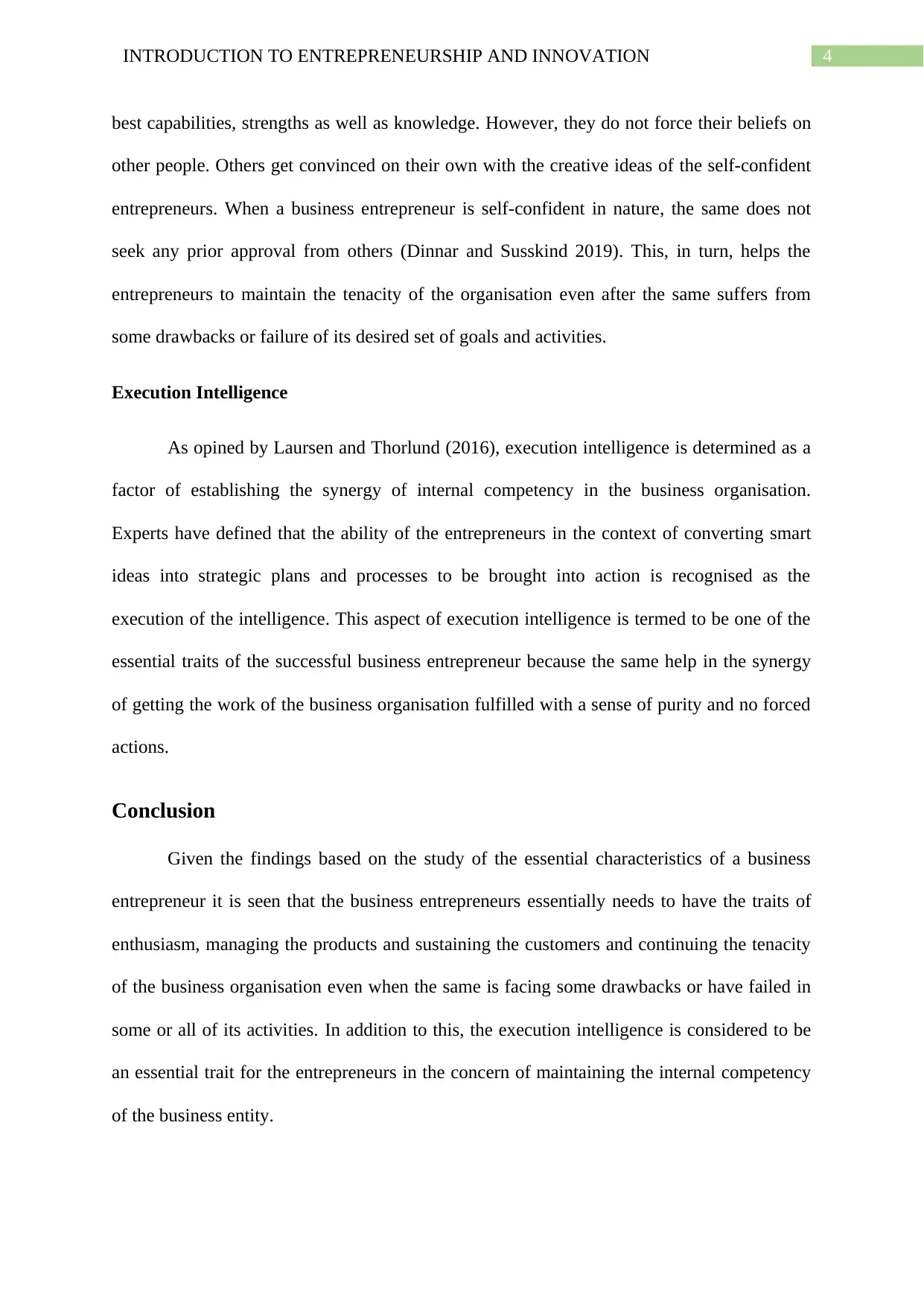
4INTRODUCTION TO ENTREPRENEURSHIP AND INNOVATION
best capabilities, strengths as well as knowledge. However, they do not force their beliefs on
other people. Others get convinced on their own with the creative ideas of the self-confident
entrepreneurs. When a business entrepreneur is self-confident in nature, the same does not
seek any prior approval from others (Dinnar and Susskind 2019). This, in turn, helps the
entrepreneurs to maintain the tenacity of the organisation even after the same suffers from
some drawbacks or failure of its desired set of goals and activities.
Execution Intelligence
As opined by Laursen and Thorlund (2016), execution intelligence is determined as a
factor of establishing the synergy of internal competency in the business organisation.
Experts have defined that the ability of the entrepreneurs in the context of converting smart
ideas into strategic plans and processes to be brought into action is recognised as the
execution of the intelligence. This aspect of execution intelligence is termed to be one of the
essential traits of the successful business entrepreneur because the same help in the synergy
of getting the work of the business organisation fulfilled with a sense of purity and no forced
actions.
Conclusion
Given the findings based on the study of the essential characteristics of a business
entrepreneur it is seen that the business entrepreneurs essentially needs to have the traits of
enthusiasm, managing the products and sustaining the customers and continuing the tenacity
of the business organisation even when the same is facing some drawbacks or have failed in
some or all of its activities. In addition to this, the execution intelligence is considered to be
an essential trait for the entrepreneurs in the concern of maintaining the internal competency
of the business entity.
best capabilities, strengths as well as knowledge. However, they do not force their beliefs on
other people. Others get convinced on their own with the creative ideas of the self-confident
entrepreneurs. When a business entrepreneur is self-confident in nature, the same does not
seek any prior approval from others (Dinnar and Susskind 2019). This, in turn, helps the
entrepreneurs to maintain the tenacity of the organisation even after the same suffers from
some drawbacks or failure of its desired set of goals and activities.
Execution Intelligence
As opined by Laursen and Thorlund (2016), execution intelligence is determined as a
factor of establishing the synergy of internal competency in the business organisation.
Experts have defined that the ability of the entrepreneurs in the context of converting smart
ideas into strategic plans and processes to be brought into action is recognised as the
execution of the intelligence. This aspect of execution intelligence is termed to be one of the
essential traits of the successful business entrepreneur because the same help in the synergy
of getting the work of the business organisation fulfilled with a sense of purity and no forced
actions.
Conclusion
Given the findings based on the study of the essential characteristics of a business
entrepreneur it is seen that the business entrepreneurs essentially needs to have the traits of
enthusiasm, managing the products and sustaining the customers and continuing the tenacity
of the business organisation even when the same is facing some drawbacks or have failed in
some or all of its activities. In addition to this, the execution intelligence is considered to be
an essential trait for the entrepreneurs in the concern of maintaining the internal competency
of the business entity.
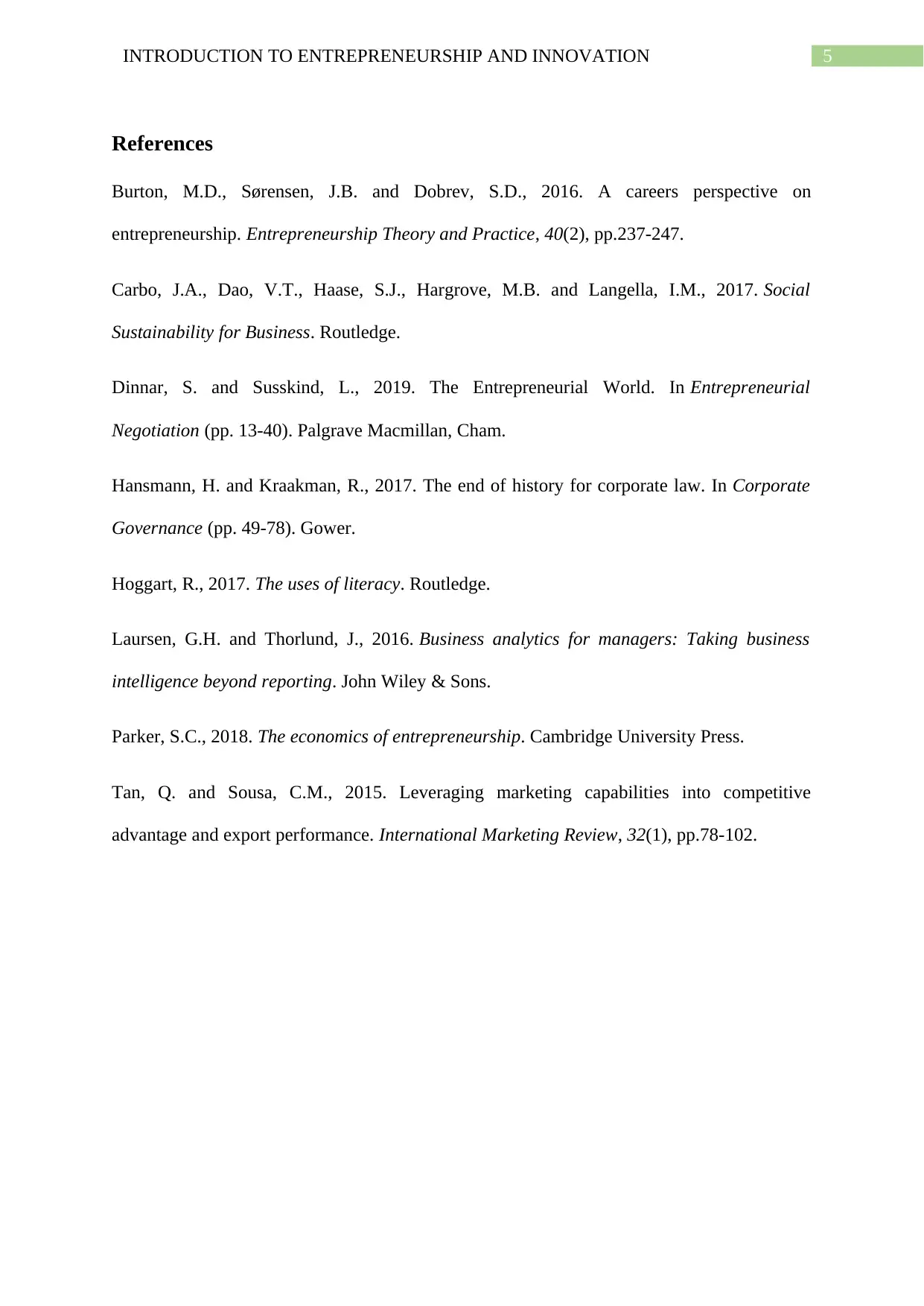
5INTRODUCTION TO ENTREPRENEURSHIP AND INNOVATION
References
Burton, M.D., Sørensen, J.B. and Dobrev, S.D., 2016. A careers perspective on
entrepreneurship. Entrepreneurship Theory and Practice, 40(2), pp.237-247.
Carbo, J.A., Dao, V.T., Haase, S.J., Hargrove, M.B. and Langella, I.M., 2017. Social
Sustainability for Business. Routledge.
Dinnar, S. and Susskind, L., 2019. The Entrepreneurial World. In Entrepreneurial
Negotiation (pp. 13-40). Palgrave Macmillan, Cham.
Hansmann, H. and Kraakman, R., 2017. The end of history for corporate law. In Corporate
Governance (pp. 49-78). Gower.
Hoggart, R., 2017. The uses of literacy. Routledge.
Laursen, G.H. and Thorlund, J., 2016. Business analytics for managers: Taking business
intelligence beyond reporting. John Wiley & Sons.
Parker, S.C., 2018. The economics of entrepreneurship. Cambridge University Press.
Tan, Q. and Sousa, C.M., 2015. Leveraging marketing capabilities into competitive
advantage and export performance. International Marketing Review, 32(1), pp.78-102.
References
Burton, M.D., Sørensen, J.B. and Dobrev, S.D., 2016. A careers perspective on
entrepreneurship. Entrepreneurship Theory and Practice, 40(2), pp.237-247.
Carbo, J.A., Dao, V.T., Haase, S.J., Hargrove, M.B. and Langella, I.M., 2017. Social
Sustainability for Business. Routledge.
Dinnar, S. and Susskind, L., 2019. The Entrepreneurial World. In Entrepreneurial
Negotiation (pp. 13-40). Palgrave Macmillan, Cham.
Hansmann, H. and Kraakman, R., 2017. The end of history for corporate law. In Corporate
Governance (pp. 49-78). Gower.
Hoggart, R., 2017. The uses of literacy. Routledge.
Laursen, G.H. and Thorlund, J., 2016. Business analytics for managers: Taking business
intelligence beyond reporting. John Wiley & Sons.
Parker, S.C., 2018. The economics of entrepreneurship. Cambridge University Press.
Tan, Q. and Sousa, C.M., 2015. Leveraging marketing capabilities into competitive
advantage and export performance. International Marketing Review, 32(1), pp.78-102.
⊘ This is a preview!⊘
Do you want full access?
Subscribe today to unlock all pages.

Trusted by 1+ million students worldwide
1 out of 6
Related Documents
Your All-in-One AI-Powered Toolkit for Academic Success.
+13062052269
info@desklib.com
Available 24*7 on WhatsApp / Email
![[object Object]](/_next/static/media/star-bottom.7253800d.svg)
Unlock your academic potential
Copyright © 2020–2026 A2Z Services. All Rights Reserved. Developed and managed by ZUCOL.





